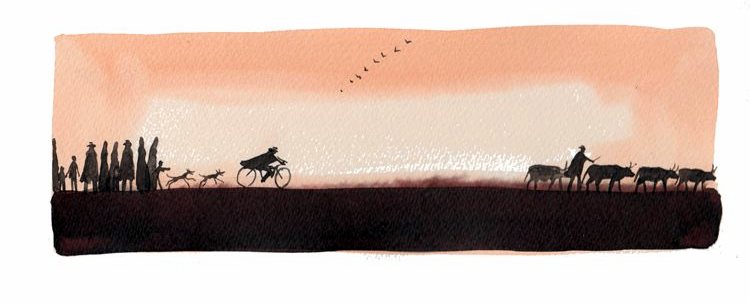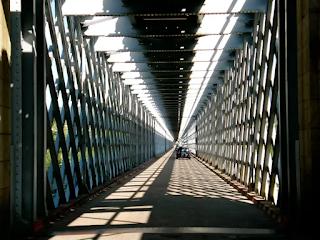Each day I would walk North along the old Roman roadways, the stone, humpbacked bridges, and forest paths that have brought pilgrims from Porto for thousands of years. Limestone flags have been worn down by legions of feet before me. The road has changed little. Through the vineyards and eucalyptus forests, through the farmyards and bucolic peace, through the North of Portugal in the water-colour, wintry, sunshine. The land was devoid of young people – they have left for Brazil and the hope of prosperity – they have left a land melancholy, bordering on Gothic. Black, arthritic, vines twist behind ornate, wrought iron, rusting gates. Decaying protection for valuables long gone.
In the evening I would eat baked pike or tench or the ubiquitous salt cod bacalao, drinking bottles of Super Bock and cold sweet glasses of Porto Brancho. I would be packed and on the road before seven each morning and be moving well before the grey light of dawn showed my first yellow arrow.
There is a Portuguese word, Saudade, for which there is no direct translation but it broadly means the love that remains after someone has gone. This was melancholia with knobs on. I am tempted to tell Portugal to stop socializing with other depressed countries.
After five days on the road I walked down the hill in Valenca in Portugal, across the big metal EiffelBridge and into Tui in Galician Spain. Bridges had become an important aspect of my journey and they resonated with the historic importance they would once have had. Crossing a bridge normally meant a change in landscape, a change of people and this time a change in language. And, as bridges over water are at the lowest point in the vicinity, the road that leads out is invariably uphill.And so I walked into Spain in early December and Spain was beautiful in the tourist free winter. There is a man roasting chestnuts and the smoky, wintry smell is carried along with the strains of a busker playing a set of Galician pipes. Evocatively named towns like Pontevedra, Redondela and Padron signpost good times ahead. There is a big copper, bas relief, commemorating members of the Quinta Brigada slain in Tui and, skateboarding past the symbols of their recent history, tanned boys in white t shirts leap in a timeless dance before pretty young girls.
Incongruously, there are orange trees along the street, I bend to pick a fallen fruit from the grass verge. I peel it, going down the street and marvel at the different plump sections packed together in one orange nation. I steal off Galicia and taste it – it is both bitter and sweet and irrepressibly fresh.




No comments:
Post a Comment